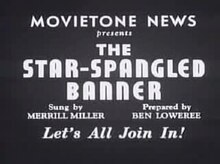Robert Merrill
Robert Merrill (* 4 June 1917 in Brooklyn , New York as Moishe Miller ; † 23. October 2004 in New York) was an US -American opera singer ( baritone ).
Life
Merrill grew up in Brooklyn as the son of a Jewish family of Polish descent. According to credible information, the family name was originally not Miller, but Milstein, through which the young artist could later be immediately identified as a Jew. He received his first singing lessons from his mother Lillian Miller and later studied singing with Samuel Margolis .
During this time he also played for a semi-professional baseball team at times . He began his singing career under the name "Merrill Miller" in tourist bars. Since around 1940 he used the stage name "Robert Merrill" because he feared discrimination at the major opera houses because of his Jewish origins.
In 1944 he made his operatic debut in Trenton ( New Jersey ) as Amonasro in Verdi's Aida , alongside the once world-famous tenor Giovanni Martinelli , who, after leaving the stage, traveled through the American provinces with his own opera company. After winning the New York Metropolitan Opera's Auditions of the Air young radio competition , he made his debut at this opera house in 1945 as Germont in Verdi's La traviata . Under artistic director Rudolf Bing , he finally became one of the stars of the Metropolitan Opera ensemble, where he sang until 1976. With his 787 appearances there and numerous radio and record recordings (with Arturo Toscanini among others ) he became known worldwide. Together with the Swedish tenor Jussi Björling , he formed the “dream team” of the Metropolitan Opera for several seasons. They first appeared together in the 1949–50 season in the opera Don Carlo by Giuseppe Verdi. The tenor-baritone duets from operas by Giuseppe Verdi , Giacomo Puccini and Georges Bizet , both recorded in the winter of 1950–51, are still regarded as unsurpassed reference recordings today. The recording of the duet “Au fond du temple saint” from Bizet's opera Die Perlenfischer was inducted into the “Hall of Fame” as one of the most important and perfect music recordings of the record era.
In addition to his permanent engagement in New York, Merrill has made numerous guest appearances at major American and European opera houses. Alongside Leonard Warren , whose successor he was at the Metropolitan Opera, Merrill is considered the most important American baritone.
Merrill became known to a wide audience when he sang the American national anthem annually to open baseball season at the New York Yankees Stadium . In addition, his record of the national anthem was played there before every home game.
In 1993 he received the National Medal of Arts .
Merrill's first marriage was to the opera singer Roberta Peters . In his second marriage, he was married to the pianist Marion Machno, with whom he had a son and a daughter.
Robert Merrill's grave is in the Sharon Gardens Cemetery in Valhalla, New York .
Worth mentioning
In 1952 Merrill played a role in the musical comedy Aaron Slick from Punkin Crick , although the director of the Metropolitan, Rudolf Bing, had forbidden him to do so. For his participation in the strip, which is described as one of the "all-time worst movies", the singer had to sit out for a season and apologize in writing to Bing.
Fonts
- Robert Merrill / Sanford Dody: Once more from the beginning . MacMillian, New York 1965 (autobiography)
- Robert Merrill / Fred G. Jarvis: The Divas 1978 Simon & Schuster, New York 1978 ISBN 0-671-24239-3 (novel)
- Robert Merrill / Robert Saffron: Between acts. An Irreverent Look at Opera and Other Madness . McGraw-Hill, New York 1976 ISBN 0-07-041501-3
Web links
- "Great Singers Remembered Moishe Milstein (Robert Merrill): Effortless Voice", by Philip Ehrensaft for La Scena Musicale 2005
- KlassikAkzente - Robert Merrill: The Metropolitan (with photo)
- "Robert Merrill: The Mensch of the Metropolitan" (Washington Post article)
Individual evidence
| personal data | |
|---|---|
| SURNAME | Merrill, Robert |
| ALTERNATIVE NAMES | Miller, Moishe (maiden name) |
| BRIEF DESCRIPTION | American opera singer (baritone) |
| DATE OF BIRTH | June 4, 1917 |
| PLACE OF BIRTH | Brooklyn , New York |
| DATE OF DEATH | October 23, 2004 |
| Place of death | new York |
